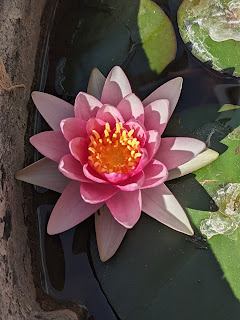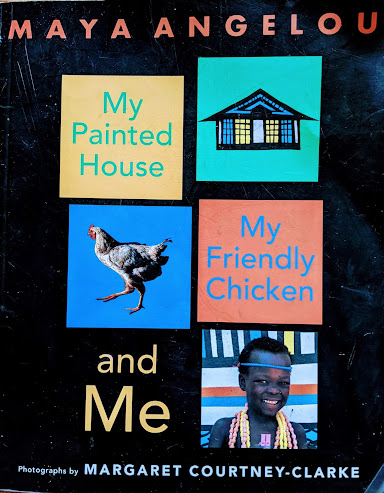Finding Joy on Netflix
I wasn’t expecting how personal it would feel to watch the documentary MISSION: JOY – Finding Happiness in Troubled Times on Netflix. Watching this film about the friendship between the Dalai Lama and the late Archbishop Desmond Tutu, it felt as if two big pieces of my life were coming together.
Like everyone else, I wouldn’t be who I am were it not for my history, my DNA, my having been born and growing up where I did -- which in my case, was in South Africa during Apartheid.
I wouldn’t be who I am were it not for my mother, who was sick for so much of my childhood, but so passionate about so many things when she was well, like art and reading and making meringue castles for our neighborhood parties. Or my father, who was so funny and generous and brave, yet never quite shook the impacts that growing up poor and fatherless left him with. Nor would I be who I am if it weren’t for my brother, who was born when I was four years old, turning me into a bossy and protective big sister.
Watching the part in MISSION JOY where Archbishop Tutu shouts, “We are going to be free!!” I remembered being about ten, watching an old, Black woman struggling to climb the stairs of the bus to the upper deck. Being White, I was allowed to sit downstairs, in the front of the bus. We were taught to get up for old people and give them our seats, but that didn’t apply to old Black people, who weren’t allowed to sit where we were. I remember feeling prickly with confusion, wanting to give the frail old woman my seat and knowing I couldn’t.
About five years later, I went to my friend’s house and saw something unimaginable: young people of all colors hanging out together. My friend’s dad had been “banned” by the government for advocating for the ending of Apartheid, but he didn’t let that stop him from inviting whomever he wanted to his house. I remember looking around that living room, watching everyone talking, listening to music, just enjoying each other’s company, and feeling something like joy. To this day, when I’m around a diverse group of people who are hanging out and enjoying one another’s company, I still feel something like joy.
So that was the first piece – being born and growing up in South Africa, with all its beauty and all its ugliness -- that resonated with the setting, the accents, the pain and the compassion of Archbishop Tutu while watching the film.
The second piece began when my mother died. I was 19 and she was 38. Six months later my father, brother and I were on our way to Los Angeles, California, where my dad’s sisters had moved two years before, to start a new life. My mother’s death, being wrenched away from my home, friends, and all that was familiar, and landing in a very strange new world, were all shocking in their own ways and it only recently occurred to me that maybe all that grief, loss and change in such a short time contributed to my diagnosis of generalized anxiety disorder some years later.
We all have our trauma. We all have our stories. We all have our ways of coping with pain. For the Archbishop Tutu and the Dalai Lama, prayer, meditation, compassion and laughter have all played a part in how they were able to cope with their own and the collective suffering of their people.
We never know what’s going to click with us – what’s going to help us untangle the chaos of our minds and calm us down a bit. Like many other Jews, something about Buddhism clicked with me, pretty much as soon as I discovered it in my thirties. I love how forgiving it is, how much room there is for error and starting over again. And again.
My original copy of Vietnamese monk Thich Nhat Hanh’s Peace is Every Step is filled with underlinings and notes.
Breathing in, I know I am breathing in.
Breathing out, I know I am breathing out.
Breathing in, I calm my body.
Breathing out, I smile.
The concept of mindfulness was as foreign to me as Vietnam, but it made enough sense that I was able to grab hold of it, and have never really let go – at least not for too long.
I had no idea that one day I would move to an area of San Diego near where Thich Nhat Hanh would build Deer Park Monastery and would have the chance to participate in several “days of mindfulness” led by Nhat Hanh.
I wish I could say that mindfulness and meditation were enough to take away my anxiety, but it also took medication, years of therapy, endless journaling and numbing out on House Hunters International. And still I get very anxious at times.
But it’s okay. We all have our stuff and as I’m getting older my practice gets deeper, my compassion for myself grows, and the Buddhist teachings make more sense.
When I watched the film on my living room sofa I was feeling a bit off emotionally and physically tired, putting off things I needed to do, vulnerable to worry and irritation. But I’d also been re-reading my all time favorite Buddhist teacher Sylvia Boorstein’s Happiness is an Inside Job and I was reminded that everything changes, that my mood would get better, and that there were things I could do that would help.
So this film felt very dear and personal to me. I haven’t met the Archbishop Tutu, but I have been in the presence of and written about the Dalai Lama and see him as a person filled with holiness – as we all are – and ordinariness – as we all are too. https://www.huffpost.com/entry/dalai-lama_b_1468375
One of my favorite parts of MISSION JOY is when Tutu’s daughter says, “Honestly, the energy between them is 8 year old boy.” How right she is. The mischievous boys who delight in teasing each other, are still very much present in the old men throughout the film –and so is their suffering. It’s all there in them both. They are funny, kind, resilient, sad and flawed.
Just like me. Just like you.





Comments
Post a Comment